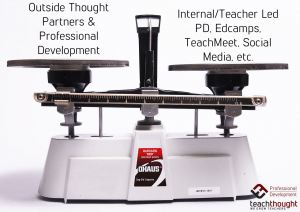Professional Development: A Delicate Dance
contributed by Drew Perkins
Professional Development. We need it. You need it. Our students need us all to do it but how? And when? And about what?
But just mention those two words, Professional Development, to almost any teacher and you’re quite likely to get an unpleasant response. A roll of the eyes, a furrowed brow…maybe even an “ugh.”
A recent trend, very likely in response to this sentiment, is teacher-led PD. Edcamps and TeachMeets seem to be popping up everywhere and rightfully so, they can be really great. This isn’t your typical, go to a conference or PD and come back to the staff meeting and present as though you’re now the expert. Who would think that’s a good idea, right? No this is informally organized and organic. Teachers share their expertise with teachers and often voluntarily. There are other ways to do it of course. Teachers are organizing and leading PD at their schools worldwide and thankfully in many cases their “administration” is even getting behind the practice.
We love it.

But this threatens those of us who offer professional development as an outside partner right? Well, I suppose in some way it does, but that’s where we get to this delicate dance. Like dancing, learning requires balance. Lose that balance and you’ll fall.
Progressive educators rail against standardization as an imbalanced approach. Our current state of imbalance between the Culture of Achievement vs. Culture of Teaching and Learning leaves teachers and students feeling like they’re falling down a black hole of ineptitude. Dances like these are ones where the partner does not match the contribution by teachers and students, thus the stumble.
No, if we’re dancing with a partner, we want a give-and-take relationship. We want leadership, communication, collaboration, and creativity. If we do happen to stumble or fall we want our partner to be there to pick us up. We want balance and sometimes an outside voice can be just that.
Sometimes we should dance alone, and to be clear, dancing alone can be really productive. But too much dancing alone can leave you imbalanced in much the same way as listening to your own voice in an echo chamber. Schools should absolutely leverage the expertise and leadership of their own staff. It would be a shame not to. But balancing that with outside voices that ask great questions and help refine clarity and purpose while building internal capacity is also important.
Internally here at TeachThought, we fight against the confirmation bias that really kills thinking and similarly, schools have to fight against the dynamic of teachers leading PD that just reinforces what they think their leadership wants from them. As a teacher, I remember principals coming into after-school staff meetings and proclaiming, “The answers are in this room” but what they really meant was “I’m going to have you talk until I hear what I want you to say.” To be clear, too much outside voice is also imbalanced and if your professional development partner is not heavily including those internal voices and questions of your teachers and other stakeholders then you may want to reconsider the value.
Another delicate aspect of Professional Development is the previously mentioned negativity. As a teacher I often expressed those same sentiments when it was time for “PD” and I recognize that sometimes I will have to overcome that stigma when leading a workshop or session. Of course much can be said for the work leading up to this stage in creating perceived need and buy-in from the teachers that creates a pull, not push, dynamic.
But this means I have to be that good dance partner, communicating and collaborating in a way that focuses and guides our learning and works on the questions and voices of those teachers.
Just like in a classroom where we expect differentiation, it’s vital that professional development learning meet teachers and staff where they are in their growth and work together to move that forward. Just like in a classroom this often is best achieved by individual or small group work balanced with a thoughtful facilitator to help guide and refocus with the additional perspective of experience and expertise.
Ideally, professional development should never elicit responses like “How long will this take, and what do we have to turn in?” and we applaud the movement for teachers to lead their own learning. Just like a good dance, consider balancing that learning with the expertise and experience of an outside partner who will be there to support you should you stumble.
The Delicate Dance of Professional Development; Image attribution flikr user Michael Coghlan
